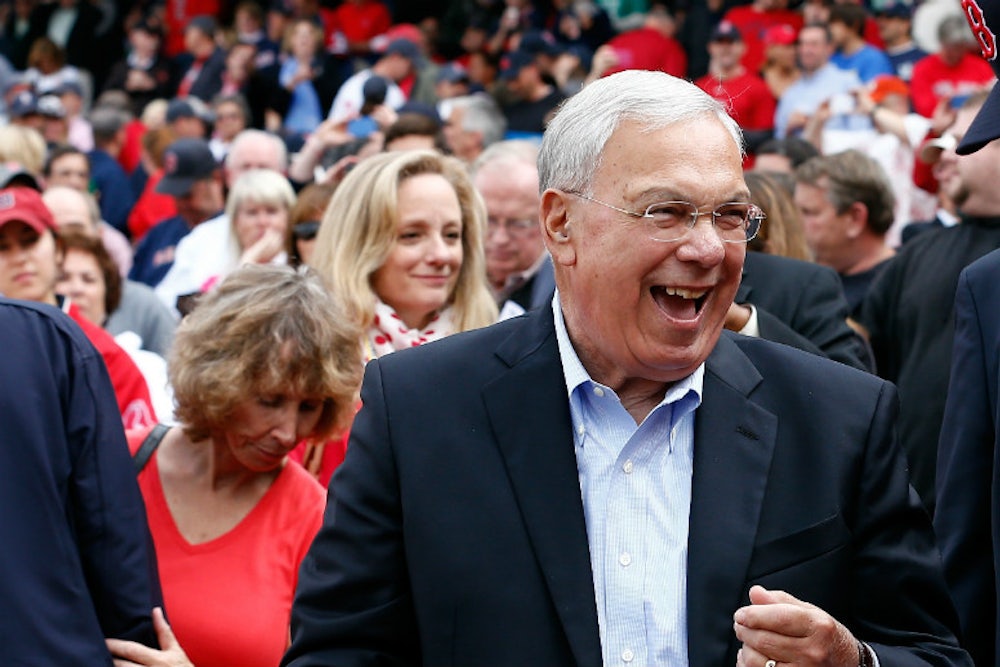A great American city has lost a great American leader. Thomas Menino, Boston’s longest serving mayor, died on Thursday morning—just months after his final term ended and just days after he announced he was suspending treatment for the cancer taking his life.
Menino first became mayor in 1993, when, as president of the relatively weak City Council, he was first in line to succeed the outgoing mayor, who had accepted an ambassadorial position from the Clinton Administration. A few months later, Menino won election in his own right, something he would proceed to do four more times. Those wins, and his remarkable twenty-plus year tenure, were testimony to his skill at both policy and politics.
Writeups in the Boston Globe and Boston Herald, written by people who followed Menino's career much more closely than I did, tell his story well. The son of a factory worker, Menino was an old-fashioned pol who believed public service was something to be done and not to be talked about. Sometimes ridiculed for his lack of vision and eloquence, he spent as much time as he could in Boston’s neighborhoods.
My favorite factoid about Menino comes from a 2009 Globe survey, in which 57 percent of respondents said they had met the mayor personally. Extrapolating from the population, the Globe figured that meant Menino had met roughly 250,000 of his constituents—a remarkable figure, and perhaps one reason his approval hovered in the stratosphere for most of his time in office.
Boston was utterly transformed during Menino’s tenure, from a city still struggling with racial scars and de-industrialization to a prototype for the modern, multicultural metropolis. That progress wasn’t all or even mostly Menino’s doing: The city, with its high concentration of universities, software companies, and medical institutions, was perfectly positioned to take advantage of the burgeoning high-tech economy. But Menino was an unrepentant liberal who believed that government had a role to play, as a guarantor of economic security and an incubator of progress—whether it was building an “innovation district” for tech workers or creating “main street” revitalization projects that became a model for similar efforts around the country.
Likewise, Menino believed that good government required constant vigilance. His fanatical attention to detail helped earn him the nickname “urban mechanic” and made him a few enemies along the way. “Like any hard-core politician, Menino rarely forgot a favor, and he harbored personal grudges,” the Globe editorial page wrote. “But he was absolutely committed when it came to evaluating and correcting the city’s problems.”
It also helped that Menino was committed to inclusiveness, even if that meant challenging prejudices in a city notorious for them. One of Menino’s most famous acts was his decision to march in the Boston’s gay pride parade, while boycotting the traditional St. Patrick’s Day parade because organizers wouldn’t allow groups that supported LGBT rights. Sue O’Connell, publisher of the LGBT newspaper Bay Windows, explained what happened in a remembrance for WGBHnews.org:
He was asked at one of the first neighborhood meetings he attended as mayor if he would march in the traditional St. Patrick’s Day Parade. The organizers, the Allied War Veterans Council, had won a US Supreme Court ruling for the right to exclude gay groups from the parade. Menino told me that he glanced at his chief of staff—openly gay Anne Maguire—and blurted that if gays can’t march he won’t march. … He never marched.
The Boston Pride Parade, celebrating LGBT pride each Junes, was a different story. Menino often referred to the parade as “my parade”. In a country where many gay groups fight to fly a rainbow flag on city flagpole, Menino raised the rainbow flag at City Hall Plaza each year with pomp, led the Boston parade and allowed uniformed Boston Police officers to march. He opened Boston City Hall and hosted the Boston Alliance of Gay and Lesbian Youth’s (BAGLY) annual gay prom for teenagers at Boston City Hall. These public actions were supported by political action—Menino supported the distribution of condoms in Boston Public Schools, and supported anti-bullying legislation.
“Menino, as reported many times, may have been a bully,” O’Connell noted. “But he was our bully.”
Menino struggled with health problems throughout his life, including Crohn’s disease, high blood pressure, and various orthopedic issues. Some were more serious than others, many were painful, and none could keep Menino from tending to his neighborhoods. Seth Gitell, an old friend of mine who was Menino’s press secretary, remembers a previous hospitalization—for an earlier and less serious bout with cancer. Writing for the Globe, Gitell recalls:
The mayor wanted to go out and meet the public soon upon his discharge, starting with one of his frequent neighborhood tours of local businesses, this time in West Roxbury. While his ailment then, thankfully, was a slow-moving form of soft tissue cancer, it nonetheless required a deep incision that hadn’t quite healed. Just getting in and out of the car seemed agonizing. But he made his way into Hanley’s Bakery, bought a few of their signature brambles, and chatted with some customers.
As the visit went on, all seemed pretty straightforward fare for a mayor who had done this countless times before. It was only moments later, when he removed his jacket and returned to the car that I saw the area around the bandage had stained his white shirt pink with blood.
It was an act that Menino would reprise later, famously, after the 2013 Boston Marathon bombings. Menino, who was in the hospital for a broken leg, checked himself out early to attend the first news conference. Days later, at the memorial service, he rose out of a wheelchair to address the crowd from the pulpit. The scene was reminiscent of Roosevelt, rallying the country in the Depression, but in style and substance Menino was a self-described Truman man. “I hung his portrait behind my desk at City Hall,” Menino called in his memoir. “A plain-spoken man of the people.” Just like Menino.
